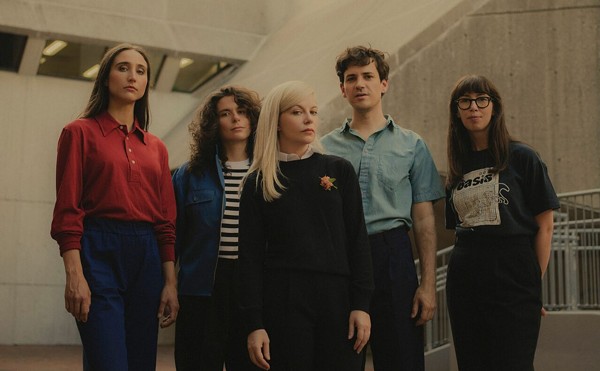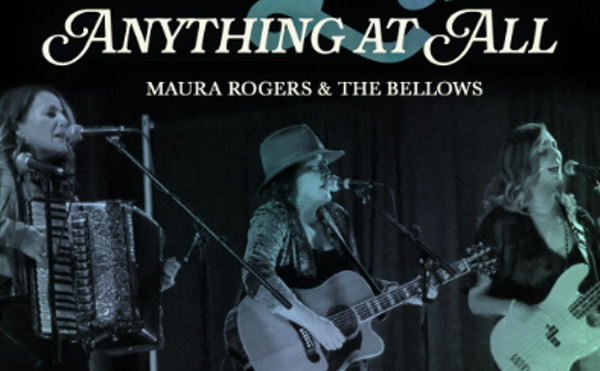In recent years, Victory's distinguished roster has included emo-generation breakouts Thursday, Atreyu, and Hawthorne Heights. The latest generation, meanwhile, has made it onto the roster by playing private shows for just the Victory staff -- clinical conditions, where employees can't be swayed by a biased crowd. After a trial set, the young, hip staff vote on whether to accept a band into their fraternity-like label.
"It's so nerve-racking," says singer Branden Langhals. Taking a break from watching Harold and Kumar Go to White Castle while hanging at his Ohio City apartment, a cozy pad where a white cat stalks well-worn wooden floors, Langhals and the band recall the stressful audition.
"It's this little space, with all those microphone stands around, sticking out like daggers," adds bassist Teddy Feighan. "[Guitarists] Jack and Mikey were running up walls and jumping off. It was the best show we've ever played."
"And the staff just stand there with their arms folded," continues Langhals. "They're not supposed to clap, but they did."
With employees sending the band a wave of congratulatory e-mails, Victory signed the group to a four-album deal, all but guaranteeing that DSI bandmates will spend their late teens and early 20s on the road with some of the leading names in pop-punk. It's a huge break, arriving only two years after DSI was formed. Hailing from Rocky River, Port Clinton, and points in between, DSI grew up listening to Victory bands. The band played every Cleveland venue that would have them, weathering lineup changes while evolving from a screamo group to a post-genre sextet.
Langhals is the group's potential poster boy. He's earnest, driven, and carefully groomed -- with a hairdo that looks like an overgrown bowl cut/mullet hybrid. Feighan, in contrast, represents the scruffier side of emo fashion, sporting fuzzy sideburns and a white hooded sweatshirt. Both wear nose hoops and tight jeans. They definitely have the look, and the music is solid as well -- thanks to some top-notch help.
DSI recorded its new disc, The Very Air We Breathe, with Sal Villanueva, who produced breakout emo stars Thursday and Taking Back Sunday, two of Langhals' idols. Working with Villanueva at New Jersey's Big Blue Meenie Studios was the next step in the band's rites of initiation: The studio staff gave group members nicknames over their first few days.
Langhals became "MySpace" when they noticed him logging excessive time on the website. Feighan became "Darf" for no apparent reason. The same lack of reasoning goes for guitarist Mikey Arnold's new name of "Beezer." Guitarist Jack McGinty was lucky; he obtained two names: "Jack Jack" and "Timex" (the latter is a long story with roots in a dick joke). And after showing up in a coat that looked like a Russian military uniform, drummer Zach Evans was dubbed "Grabnik." Then the Meenies christened keyboardist, programmer, and hypeman Austin Bishop "Merch," kidding that he did so little musically, he might as well work the merchandise table between parts.
Bishop's role might be small, but it's a driving element in their show and sound. Even when crowds are modest, he dives into the audience and runs around. More important, on "The Heist," the new record's leadoff single, Bishop drops the kind of booming bass you'd hear at a velvet-rope dance club. He makes DSI the latest in punk crossover, yet another once-unimaginable combination: post-emo metallic dance-pop.
"We all love indie dance-scene bands like Bloc Party," says Langhals, explaining the left-field dance influence.
Now the band is literally on the heels of Fall Out Boy, the reigning kings of pop-punk. Victory's relentless street team is crossing the country in a caravan, giving free samplers -- featuring DSI -- to young FOB concertgoers who have a predisposition to punky rock that you can dance, sing, cry, or slam to. Of course, aggressive marketing can lead to dubious rhetoric -- like The Very Air's publicity material, which gushes about the album's "danceable mosh parts." DSI concedes that the stuff sounds a little forced.
"I think they like the word 'mosh,'" explains Langhals. "It doesn't mean mosh, but stuff you can move to. What they're talking about is the fact that we have breakdowns -- not heavy, heavy stuff, but some songs might have really giant dance parts. So I think it means we combine different kinds of music to create whatever kind of mutant our music is."
"I say it's rock music," adds Feighan.
"One press release says, 'We think our music is a soundtrack, and you can be a part of the script,'" says Langhals.
"The people at the studio made fun of us and called us dreamo because it can be spacey at times or dreamy or dancey," says Feighan.
But the sound's not all light as a cupcake. Evans' aggressive, technical drumming and Arnold's metal background give the band a hard edge that offsets Bishop's drifting instrumental interludes. Langhals writes lyrics about unrequited obsession and love, but also contributes some genuinely introspective moments that stop far short of tears-on-my-hoodie clichés. "The Heist" takes a thoughtful look at alcohol abuse, and "Tonight We Dance" has harsh words for the scene police (Langhals likes elitists less than George W. Bush does).
Even with the band's fresh approach to the emo thing, they know the scene is saturated. But at least they've made it past the fraternity's front door, and they're confident that they will continue writing music that keeps them there.
"The best thing you can do is try and create something pleasing to the ear," says Langhals. "Emo isn't just four-four music any more. It's a mutt of every genre. I think that there's so much more that can be done."













